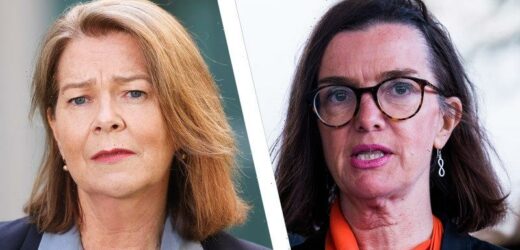A trial program to give women fleeing violent relationships financial support is taking more than four weeks on average to get the money to them while demand is almost twice as strong as the government anticipated.
The escaping violence trial program started in October, offering women up to $5000 over 12 weeks – up to $1500 in cash and the rest in other financial support such as covering goods and services, rental bonds or school fees. The government extended the scheme for three more years in the March 29 budget and added $40 million to the current financial year.
Social Services Minister Anne Ruston acknowledged there were challenges with the payments, while ACTU president Michele O’Neil said the scheme appeared to be “poorly planned and underfunded”.Credit:James Brickwood/Alex Ellinghausen
The program is demand-driven but the funding levels anticipate about 12,500 women accessing it each year.
New figures from the Department of Social Services show that in less than six months, more than 10,000 women have applied for the program.
More than 4000 had received payments by the end of March, with $8 million paid out through UnitingCare, which is running the scheme.
A further 6000 applications were being considered “including through discussing needs assessments and payment planning with applicants”.
The average amount received is $3706, with two-thirds of people receiving the full $5000 in financial assistance.
After answering questions from The Sydney Morning Herald and The Age about the program, the department later added: “UnitingCare Network has been advised that the government’s preferred position is to ensure all individuals get the maximum support they seek”.
The government says people who have never accessed other domestic violence support services are reaching out for the first time to seek the payment to get out of their situations.
In April, department officials told Senate estimates that four in five women were hearing back within two business days of initially contacting the service.
The average wait time for their applications to be approved was 17 business days, and then it took a further two days for them to receive the first money.
Those working in the family and domestic violence sector say financial support is definitely needed, but it has to get to women as fast as possible.
“The only way to make it an effective escaping violence payment, is to make sure that the funds are immediately available when someone’s in an unsafe situation and needs to escape,” Full Stop chief executive Hayley Foster said.
She suggested the scheme could be more accessible if victims could get the payments through whatever frontline organisation they’ve already contacted and pointed to an agreement frontline services had struck with the Red Cross, which runs a similar trial scheme for payments to women on temporary visas, for how that could work.
The head of the sector’s Victorian peak body Safe and Equal, Tania Farha, said financial support was integral to helping women leave abusive situations but any scheme had to be flexible and accessible.
“We’ve been hearing from our own members, and also from colleagues in other states and territories, that there are some real challenges with how these payments are being rolled out,” she said.
Social Services Minister Anne Ruston acknowledged there were challenges with “setting up a new, national program where the level of demand was unknown” but the extra funding in the budget should improve response times and meet demand.
“We are absolutely committed to getting this program right for victim-survivors and will use feedback from them, the sector and an independent evaluation to inform future decisions around the vital program,” she said.
An updated contract with UnitingCare will specify a target for a seven-day processing time.
The National Women’s Safety Alliance called for the payments to be doubled in its election policy paper. Research has found it takes $18,000 on average for a woman to set up a new life after fleeing violence.
The union movement has been advocating for 10 days’ paid domestic violence leave to be added to the legislated national employment standards. Labor has promised it would do this if elected.
The $5000 offered under the Coalition’s program is the equivalent of 6.5 weeks at minimum wage.
ACTU president Michele O’Neil said the government had claimed its escaping violence payments were a better alternative but the scheme appeared to be “poorly planned and underfunded”.
“No woman should have to choose between her income or her job and keeping herself and her children safe,” she said.
Foster and Farha said it shouldn’t be an either-or proposition, and both emergency payments and paid leave had a place.
“There’s no single solution here to this,” Farha said.
“It’s a really complicated and complex issue. And the solution has to be commensurately comprehensive and holistic.”
Cut through the noise of the federal election campaign with news, views and expert analysis from Jacqueline Maley. Sign up to our Australia Votes 2022 newsletter here.
Most Viewed in Politics
From our partners
Source: Read Full Article


